TOPIC STREAM 04: Open Design, Hardware, Manufacturing and Making
This stream covers Open Design in all its various facets (from design as a blueprint to design as process to design as an artefact) and applications (product design, graphic design, fashion design, service design, interior design, architecture, hardware, etc). Topics such as Open Hardware, Open Fabrication and Manufacturing, and Making in general are also covered. The stream will showcase contemporary research and practice in this emerging field and address some of the greatest challenges in the area. This four-day programme will bring together researchers and practitioners interested in open design, hardware and manufacturing under the auspices of the Open Knowledge Foundation’s Open Design Working Group. The stream will include keynotes, presentations, panels and discussion, practical hands-on activities and topic-focused workshops, and an exhibition with open design / hardware / manufacturing artefacts.
Key topics include:
- Open Design, co-creation, making: the peer-production of stuff and knowledge
- Sharing platform, mechanisms and practices in Open Design, Hardware, Manufacturing and Making
- Definitions of Open Design and Open Hardware
- Open Design and Hardware in the context of intellectual property legislation
The stream will also include a full week’s worth of hands-on Open Design and Hardware practice, Making and Manufacturing at the Aalto Fab Lab.
Recordings of all sessions in the MAKE auditorium (including the daily wrap-up from the sessions outside that room) are available at the streaming page at http://okfestival.org/streams/make-auditorium/
Finalised Programming
| Date | Start time | End time | Room | Title | Speakers | Content |
|---|---|---|---|---|---|---|
| 18/09/2012 | 10:15 | 18:30 | MAKE fablab | Fablab Induction | Anu Määttä, Massimo Menichinelli | Mandatory HSE induction for workshop leaders who plan to make things rather than just talk |
| 19/09/2012 20/09/2012 21/09/2012 | 11:30 | 11:45 | MAKE auditorium | Introduction to the day | Peter Troxler, Massimo Menichinelli, Jürgen Neumann, Frederique Muschinesi, Ton Zijlstra | Introducing the theme of the day, overview of programme, expectations, logistics |
| 19/09/2012 | 11:45 | 13:00 | MAKE auditorium | Open Economy &endash; Future Factory | Gerin Trautenberger | During the past ten years, we have approached what might be the end of industrial mass production and fabrication. We have seen the development of a post-industrial production system that is able to handle individual aspects in mass customised, small serial production. In the production process each new product can be optimised or adapted for personal taste or individual needs and the final product will be unique and special. This new manufacturing and production system has been enhanced by computational fabrication and standardised interfaces, giving more freedom to engineers, designers and architects. We can already witness how these new technologies, new approaches and new ways of working and producing are growing. One example is the projects of the Open Design Pop-Up-Store for the City of Design Graz (Design month 2011)1. The Open Design Pop-Up store was realised with a full digital workflow, and the shop interior as well as the products sold in the Pop-Up Store were made entirely with computational fabrication. The products for sale where designed globally, but all of them where produced locally. The region of Styria, where Graz is the capital, profited form the added value of manufacturing since all the goods where produced in the region. All products where manufactured in small numbers or on demand. On the plus side no cost of transportation, no cost of stocking. The Open Design Pop-Up Store was a demonstration of a new way of collaboration and production in Europe. The lecture will not only focus on the advantages of a full digital workflow and computer aided manufacturing but will also examine the developments in Austria and on European level. |
| >> VIDEO (start time 5:50) | 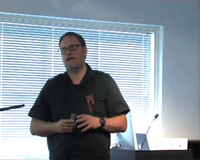 |
|||||
| 19/09/2012 | 11:45 | 18:30 | MAKE fablab | Open design for laser cutting | Stuart Childs | Laser cutters are becoming more accessible to many educational institutions, hack spaces, fab labs and more. But how are we using them? How do we design and build things with a laser cutter? What software and file formats can we use? What are the restrictions of making things with a laser cutter, and what are the design techniques we use? How do we build 3D objects from sheet materials? How can open design affect the design process? This workshop offers the opportunity to learn, share skills, discuss design techniques and try hands-on laser cutting design and making. |
| 19/09/2012 | 11:45 | 15:30 | MAKE meeting room 1 | The Maker Movement and Sustainability: a live collaborative Delphi | Cindy Kohtala | In Design for Sustainability, it is generally accepted that Open Knowledge is part of the foundation of building a sustainable society. In maker culture, openness is also a cornerstone of operations and a guiding philosophy. But what happens when sustainability constraints meet maker culture meet Openness? How can we ensure we build a Sustainable Maker Economy? This session will be organized as a live, collaborative Delphi. Participants will be considered experts who will debate and map the key issues, opportunities and threats, likelihood and impacts. The main themes for subgroups will be suggested in advance (e.g. materials and products; equipment and processes; use and behaviour) but participants can also suggest topics Unconference style. |
| 19/09/2012 | 11:45 | 00:00:18.3 | MAKE meeting room 2 | Fab Lab Workshop: Open Mobile | Xavier Leonard | The objectives of the workshop are to produce a functioning prototype of a pulse oximeter integrated with a mobile phone over a four-hour period and to create a document of conclusions and questions that will help advance subsequent open mobile hardware projects. We will use materials supplied by the facilitators, along with the resources and facilitates of the Aalto Fab Lab to achieve this. |
| 19/09/2012 | 14:00 | 15:30 | MAKE auditorium | Open Design, IP and Creative Commons licences | Thomas Margoni | This will be a legal talk that will: 1. Analyze the types of Intellectual Property rights involved in design products; 2. Focus on two of them, that at the moment look the most important: copyright and design rights; 3. Offer a European legal perspective; and 4. Analyze if and how current licences such as Creative Commons can be applied to design products, and if not what are the alternatives. After the presentation, open-designers can freely ask about legal aspects of their activity, and Thomas and other lawyers present will try to find answers as they can vary depending on the relevant jurisdiction. |
| >> VIDEO | 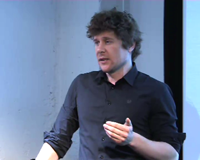 |
|||||
| 19/09/2012 | 16:00 | 18:30 | MAKE auditorium | OHANDA – Open Source Hardware and Design Alliance | Dannie Jost, Alison Powell and Juergen Neumann | What is FLOSH? Is there a legal share-a-like framewok? What are the common practices? Where are we heading? The panel will give insights from various perspectives and discuss about the future framing of Free/Libre Open Source Hardware and how we could further spread the idea and its values. Supportiing material for the RE*CAMPAIGN can be found at <a href=”http://www.ohanda.org/sites/default/files/RE_CAMPAIGN_promo.pdf”> http://www.ohanda.org/sites/default/files/RE_CAMPAIGN_promo.pdf</a> |
| >> VIDEO | 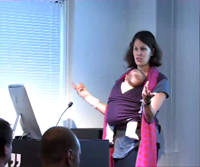 |
|||||
| 19/09/2012 | 16:00 | 18:30 | MAKE meeting room 1 | Design Capitalia An Open Source framework for co-futuring | Alastair Fuad-Luke | Design Capitalia is an Open Source thinking tool prototype (a tangible and/or digital framework) of over 30 different capitals aimed at nurturing alternative economic, social, human, political and environmental opportunities from poly-disciplinary perspectives. OKF participants can be the first to test the beta version of the Design Capitalia OS framework by testing it on real-life scenarios they bring to the event.This is the follow-up workshop of the presentation Design Capitalia An Open Source framework for co-futuring (20/09/2012, 14:00:00 h at MAKE auditorium |
| 19/09/2012 | 16:45 | 17:30 | MAKE auditorium | A talk on Fablab project documentation | Anu Määttä | Fablabs require users to share their experience of how to work with machines and document the physical objects that they made in the labs. In practice sharing of this “making of” documentation has not happened to support meaningful project sharing across labs. This is becoming increasingly painful as the number of labs is rising more each year, and one-on-one connections are no longer scaleable for keeping up with advancements made in other labs. Realistic solutions to the situation will need to take into account the existing situation: live with the diversity, while making Fablab project documentation universally searchable and enabling information exchange.This presentation will frame the issue; and a workshop will dig deeper into the problem and aim to provide preliminary solutions. Fablab documentation hackathon (21/09/2012, 16:00:00 h at MAKE meeting room 1 |
| 19/09/2012 20/09/2012 21/09/2012 | 18:30 | 19:20 | MAKE auditorium | Summary of the day | Peter Troxler, Massimo Menichinelli, Jürgen Neumann, Frederique Muschinesi, Ton Zijlstra | Parallel Hackathons and Workshops report results to the plenary. |
| >> VIDEO | 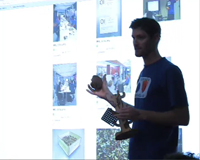 |
|||||
| 20/09/2012 | 11:45 | 13:00 | MAKE auditorium | Why We Push: how citizen demand to understand ourselves and our world is birthing the convergence of Open Hardware, Open Data, and Open Government | Xavier Leonard, Ed Borden, Ernesto Ramirez, Paul Gardner-Stephen, Adam Greenfield | Why We Push is a panel presentation on the interplay between Open Hardware design and the delivery of Open Data to users. It will explore how the growing desire to quantify ourselves and our environments is pushing hardware design to be more open. Panelists: Ed Borden (UK) is the Head of Business Development for Pachube. Ernesto Ramirez (USA) is the Community Manager for Quantified Self (QS). Dr. Paul Gardner-Stephen (AUS) is the founder of the Serval Project which develops open source tools for the deployment of infrastructureless telephony networks. Adam Greenfield (USA) is the author of Everyware, a visionary book about the dawning of ubiquitous computing. |
| >> VIDEO (start time 10:00) | 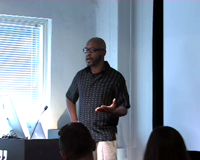 |
|||||
| 20/09/2012 | 11:45 | 18:30 | MAKE fablab | A workshop to build an open source CNC mill | Taylor Hokanson | The DIYLILCNC project seeks to improve the accessibility of CAD/CAM education and tooling. With this mission in mind, project members have designed a tabletop CNC mill that can be built by an individual on a hacker’s budget (>$1000). Version 2 of the design incorporates a wide variety of community feature requests, including an all-metric parts list to facilitate builds outside the United States. The plans are free to download, remix and redistribute at the project website. Participants build a functional DIY CNC mill from scratch. In the process they will learn about open source, hardware hacking, CAD/CAM and DIY culture.The event will result in a functional tool that will be added to the Fablab’s roster of equipment. |
| 20/09/2012 | 13:00 | 14:30 | MAKE meeting room 1 | Gender, Hardware and Open Fabrication | Frederique Muscinési | Some of the most known open hardware initiatives are women’s projects: Adafruit, created and lead by Limor Fried, Littlebits, designed and lead by Ayah Bdeir, the Open source hardware headed by Catarina Mota. Alicia Gibb founded the Open Source Hardware Association. In France, many women are involved with spreading the idea of digital fabrication, hacking and open hardware: journalists as Sabine Blanc or Ophélie Noor from Owni for instance. The first library to become a fablab in Lafayetteville comes from the initiative of a woman. Specific sharing experiences, as the Mobile Fablab, are also women initiative, etc. How to interpret this apparent better representation of women into Open Hardware? Is it real or is it just a question of visibility? Are Open hardware communities different? Thanks to the participation of several persons involved in different countries with open hardware, we’ll try to evaluate the reality of the presence of women in this field and to compare it with others fields like free software for instance. Experiences will help us to draw a contrasting panorama. The differences that could emerge could also contribute to understand what can help women to be a more powerful part of Open hardware. Finally, a theoretical point of view will both, recall us the traditional framework in which this question is included, and, deepening the concept of gender, will surely open new ways of actions for women in Open hardware. |
| 20/09/2012 | 14:00 | 15:30 | MAKE auditorium | Design Capitalia An Open Source framework for co-futuring | Alastair Fuad-Luke | Design Capitalia is an Open Source thinking tool prototype (a tangible and/or digital framework) of over 30 different capitals aimed at nurturing alternative economic, social, human, political and environmental opportunities from poly-disciplinary perspectives.This session will be continued in the workshop Design Capitalia An Open Source framework for co-futuring (19/09/2012, 16:00:00 h at MAKE meeting room 1 |
| >> VIDEO (start time 3:15) | 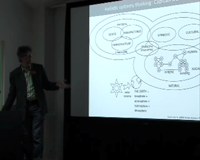 |
|||||
| 20/09/2012 | 14:00 | 15:30 | MAKE auditorium | Emerging Peer-production generation – who, what and why | Jarkko Moilanen | This presentation describes a peer-production movement, the hackerspace movement, its members and values. Building on previous work on ‘fabbing’, two different sets of results are presented: (1) empirical observations from a longitudinal study of hackerspace participants; and (2) a theoretical description of hacker generations as a larger context in which peer-production can be located. |
| >> VIDEO (start time 36:20) | 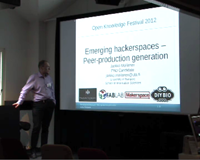 |
|||||
| 20/09/2012 | 14:00 | 15:30 | MAKE auditorium | Radical Co-creation – Emerging Modes for Open and Critical Design | Ville Tikka | The presentation describes how collaboration and open knowledge enable emerging modes of radical co-creation, developing transformative solutions and strategies to tackle the challenges of our times. We will discuss the models for open and collaborative process with multiple entry points for participation and the types of open knowledge and understanding required for radical co-creation and critical design. |
| >> VIDEO (start time 1:07:00) | 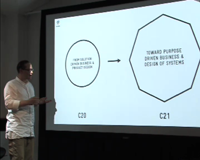 |
|||||
| 20/09/2012 | 16:00 | 18:30 | MAKE meeting room 1 | A workshop on new approaches to the practice of producing and exchanging knowledge | Julie Harboe | Information must be understood dynamically and in a positive framework in order for it to work as open source and thus turn into actual productive knowledge . The terms copyright and hacking, to the contrary, contain implications of both of power and aggression. New approaches must look for practices that can offer more convincing and integrating activities in terms of volume and dynamics. The workshop will start with an input about the position above with examples from art and education and then discussions along the keywords: tracking, transparency, exchange. Instead of thinking about new approaches as a tabula rasa making space for a new approach we need to look for actively engaging and inclusive forms of sharing and communication. These modes lean on to practical philosophy and to an understanding of practice and the responsibility of the individual in a civic society. |
| 20/09/2012 | 16:45 | 17:30 | MAKE auditorium | Open Source Hardware for Renewable Energy | Will Cleaver | Global Anchor and Solar Fire are independent open source renewable energy projects. Global Anchor from Germany working in Nicaragua, is a non-profit organisation to promote Open Source Hydro Power developing eco-conscious hydro power for rural electrification and more. Solar Fire develops high power low cost single focal point Solar Thermal Concentrators providing local autonomous renewable energy. This short presentation will show how fast and easy everybody could transform natural, endless and free energy resources into local energy supply sources, how it’s possible with openness and basic manufacturing tools. Inspirational experiences will be shared and people invited to start similar projects. Imagine a Renewable Energy Globe, we can make it NOW! |
| >> VIDEO (start time 1:00:00) | 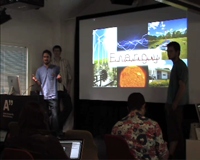 |
|||||
| 20/09/2012 | 16:45 | 17:30 | MAKE auditorium | Manufacturing in Motion – 3D printing community. | Jarkko Moilanen | Research around 3D printing as an example of commons-based peer production is still minimal (Troxler s study touches on the issues). Results from a survey study will be presented that has concentrated in defining the overall change and analysing most prominent features. |
| >> VIDEO (start time 0:30) | 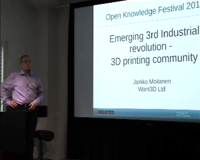 |
|||||
| 20/09/2012 | 16:45 | 17:30 | MAKE auditorium | Wikipedia Illustrated – an open design Initiative talk | Mushon Zer-Aviv | While we celebrate the explosion of open source software and collaborative projects like Wikipedia, visual art has not enjoyed similar levels of passionate and generous online contribution. Wikipedia Illustrated seeks to develop such models for the visual arts. The presentation will address the questions at the heart of this project. Is the visual aspect of Wikipedia so lacking and dated because it could only use freely licensed images? Or is it that images have to become “historical” to become removed, objective, factual, and therefore applicable to the Wikipedia guidelines? Is the Wikipedia project really inviting visual artists to contribute their work to the commons? Or is visual work inherently less collaborative? |
| >> VIDEO (start time 27:40) | 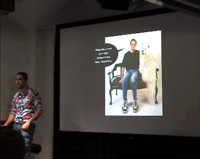 |
|||||
| 21/09/2012 | 11:45 | 13:00 | Open Design, Hardware, Manufacturing & Making Keynote @ INSPIRE Auditorium | |||
| >> VIDEO (start time 6:15) | 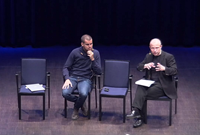 |
|||||
| 21/09/2012 | 14:00 | 15:30 | MAKE auditorium | Me, Smart Citizen | Tomas Diez | FabLab BCN: a conference about our latest project: http://www.smartcitizen.me, now in crowdfunding campaign through Goteo: http://goteo.org/project/smart-citizen-sensores-ciudadanos?lang=en |
| >> VIDEO (start time 3:05) | 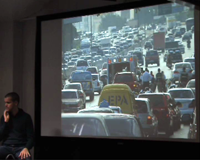 |
|||||
| 21/09/2012 | 11:45 | 15:30 | MAKE meeting room 1 | Open Design Definition Workshop | Massimo Menichinelli | The Open Design working group of the Open Knowledge Foundation invites you to the collaborative development of an Open Design definition, a crucial missing point towards developing all the other important aspects of Open Design. We want this definition to be developed and owned by a community of people interested in Open Design (graphic designers, architects, product designers, fashion designers but also hardware and software developers), not the result of a closed-door discussion. The process is then completely open source and uses open source tools. This workshop is part of a series of online and offline events for developing the Open Design definition, a process that included workshops in Tallinn (Estonia) and Manchester (UK). |
| 21/09/2012 | 16:00 | 17:30 | MAKE auditorium | DCDCity Aire | Cesar Garcia Saez | DCDCity Aire is a presentation on a citizen sensing project |
| >> VIDEO (start time 41:35) | 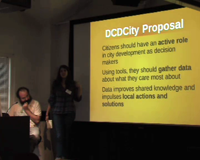 |
|||||
| 21/09/2012 | 16:00 | 17:30 | MAKE auditorium | The Development of Digital Fabrication. Case Study: knitting printer | Varvara Guljajeva | We will present our recent work on a knitting printer. In our opinion, the digital fabrication of textiles and knitted garments has been absolutely overlooked. We have reverse engineered Brother electronic knitting machine from late 1980s and turned into a machine that is able to talk to a computer. It means uploading and downloading images as patterns that can be knitted. Interestingly, the electronic knitting machines that were very up-to-date some decades ago, from the 1990s have been forgotten. Hence, we want to raise a question concerning early fabrication methods that could be upgraded for today s needs. Or in other words, the approached towards re-applying dead media. |
| >> VIDEO (start time 2:45) | 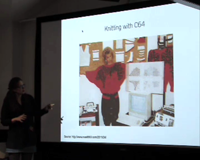 |
|||||
| 21/09/2012 | 16:00 | 18:30 | MAKE meeting room 1 | Fablab documentation hackathon | Anu Määttä | The hackathon would focus on (1) discovering ways to find meaningful Fablab documentation based on the already existing infrastructure: heterogenous data sources, little standardization. (2) drafting an initial (loose) project definition standard geared for sharing projects across different systems. Preparations taking place before the workshop include mapping out the existing data sources.This hackathon is based on the presentation A talk on Fablab project documentation (19/09/2012, 16:45:00 h at MAKE auditorium |
Participant Testimonials
“It is ironic that we now have to make hardware ‘open’ when it inherently is open, and inspiration by its very nature is building on what other people made. Yet at the end of the industrial era, it seems, locking everything is the last straw mass manufacturing is grasping to.” - Peter Troxler
Guest Programme Planners:
- Peter Troxler (Netherlands)
- Massimo Menichinelli (Finland)
- Frédérique Muscinési (Spain/France)
- Jürgen Neumann (Germany)
- Ton Zijlstra (Netherlands)
